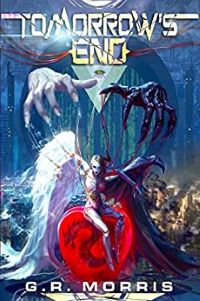Review of Tomorrows End by G. R. Morris
- Rosalba Mancuso
- 24 mag 2022
- Tempo di lettura: 3 min

I must admit that I remained particularly impressed by the cover of this book.
Initially, I had already envisioned a horror story intertwined with a science-fiction plot, but I had different expectations.
Let’s be clear: Tomorrows End is a science-fiction horror, but nothing to do with my humble expectations, which are closer to the traditional horror books that every book lover usually reads.
Tomorrows End, by American novelist G.R. Morris, is the book 1 of a futuristic series that combines philosophic elements with a supernatural tale permeated by scary effects.
The subtitle of the first part of the series is The path of a savior, which is a clear reference to the main character of the story: Kevin, an American guy who is believed to be the savior of Mankind, who, in turn, is on the verge of extinction.
The opening of the story is set in an undetermined future shrouded in a dreadful darkness. A word written in capital letters catches immediately the attention of readers. That is GENOCIDE.
Earth endured a heavy conflict between aliens and humans: New York City and Times Square don’t exist anymore.
Instead of them, only a mound of debris, corpses and rotten flesh. And these details are already enough to give you shivers along the spine and icy cold on the forehead!
After this creepy glimpse of the future, the story leads you back into time, in 1975, 1976, 1958, searching for the roots of our next extinction.
It is through this chronology that the author blends philosophic concepts with the horror story of Kevin, the son of a fallen angel who has been bestowed by alien creatures with the role to save human beings.
The boy is unaware about his powers, and, during his path, he witnesses the cruel clash between reptilians and changelogs. The former ones are the controllers of the world, the latter ones are creatures that initially lived in peace with humans, taking their shape or replacing people after their birth.
One of them is Daren, who also has the role of a savior.
Are Kevin and Daren, the modern Adam and Eve? That was my first question, during my reading.
They have in common the fact to hear unearthly voices in their minds and to be trained by aliens to better perform their important mission.
It is during the dialogues between Kevin and reptilian Robert, his master, that readers will come across immersive philosophic and biblical subjects, such as moral relativism and free will. In the story, enriched with quotes that help readers to better grasp the meaning of the single chapters, nobody seems to be who or what really is.
Is Robert a friend or an enemy? Is Kevin a true savior or a normal boy affected by schizophrenia? Usually, indeed, when one hears voices in the head, this person suffers from the aforementioned mental illness.
The writing style is, sometimes, cryptic, surrounded by the ferocity of war, death and destruction, where human victims are often the food of reptilians.
A reader must have a solid philosophic background to love this book; otherwise, he could find it hard to understand (even Kevin, the main character, scratches his head when he talks with Robert, because he is confused by contradictory events and statements).
An open-minded reader, by contrast, will find several parallels with human history, politics and economy: nothing is real, everything is controlled and manipulated, political leaders are driven by evil and behave like demons disguised as human beings.
See the spooky character of Dr. EdwardBlackthorne (the devil?), who gives wicked orders to the President of the United States, who, here, plays the role of his puppet.
Light and darkness, good and evil, our inner conflicts are the true protagonists of Tomorrows End. In its kaleidoscope of supernatural heroes and monsters, the book depicts the burlesque traits of twisted souls that led the world to the moral collapse.
If you are eager to discover it, this is the right novel to read.



Commenti